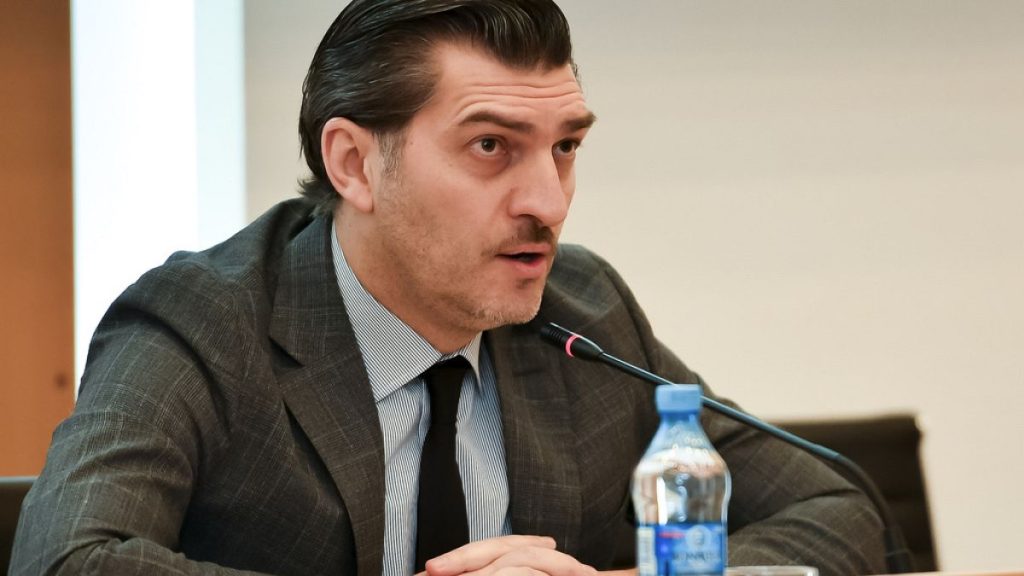Paragraph 1: A Controversial Accession and Political Landscape
Mikheil Kavelashvili’s inauguration as Georgia’s president on December 29, 2024, marks a significant turning point in the country’s political trajectory. His ascendance to power comes amidst a backdrop of controversy surrounding Georgia’s aspirations to join the European Union and escalating tensions with Russia. Kavelashvili’s victory was virtually guaranteed due to the ruling Georgian Dream party’s dominance of the electoral college, a system implemented in 2017 that replaced direct presidential elections. This system, composed of MPs and local government representatives, effectively solidified Georgian Dream’s control over the presidency. The opposition, however, views this political maneuver as detrimental to Georgia’s EU ambitions and a symbolic victory for Russia’s influence in the region.
Paragraph 2: A Disputed Election and Boycotts
The October 2024 parliamentary elections, which saw Georgian Dream retain control, were marred by allegations of rigging and Russian interference. These claims, vehemently voiced by the opposition, have fueled widespread discontent and sparked calls for a re-run of the vote. Furthermore, outgoing President Salome Zourabichivili and the primary pro-Western parties have boycotted parliamentary sessions in protest, further deepening the political divide. This boycott underscores the opposition’s rejection of the election results and their distrust of the ruling party’s political agenda. The disputed election and subsequent boycotts have created a volatile political climate, raising concerns about the stability of Georgia’s democratic processes.
Paragraph 3: EU Aspirations and Strained Relations
Georgian Dream’s decision in 2024 to postpone the country’s EU accession process until 2028 further inflamed the opposition and ignited large-scale protests. While the ruling party insists on its commitment to pursuing EU membership, it has also expressed a desire to "reset" relations with Russia. This seemingly contradictory stance has drawn criticism and fueled suspicion about the party’s true intentions. Founded by Bidzina Ivanishvili, a billionaire who amassed his wealth in Russia, Georgian Dream has faced accusations of authoritarian tendencies and pro-Moscow leanings, allegations the party consistently denies. The party’s recent enactment of laws restricting freedom of speech and LGBTQ+ rights, mirroring similar legislation in Russia, further reinforces these concerns.
Paragraph 4: A President with a Contentious Past
Mikheil Kavelashvili, prior to entering politics, enjoyed a successful football career, playing for Manchester City and several Swiss clubs. His political involvement began in 2016 as a member of Georgian Dream. In 2022, he co-founded the People’s Power movement, a political group aligned with Georgian Dream, known for its staunch anti-Western rhetoric. Kavelashvili also played a key role in drafting a controversial law requiring organizations receiving over 20% of their funding from abroad to register as "pursuing the interest of a foreign power," a law reminiscent of similar legislation used in Russia to suppress dissent. This law prompted the EU, which had granted Georgia candidate status in December 2023, to suspend the accession process and withdraw financial support.
Paragraph 5: A Defiant Outgoing President
Salome Zourabichivili, Georgia’s pro-Western president since 2018, has declared her intention to remain in office beyond her six-year term, which officially ended on December 29, 2024. She maintains that she is the only legitimate leader until a new election is held, denouncing the current parliament and Kavelashvili’s inauguration as illegitimate. Constitutional changes prior to Zourabichivili’s election had significantly reduced the president’s powers, rendering the role largely ceremonial. However, she has become a vocal critic of the ruling party, accusing it of pursuing pro-Russian policies. Georgian Dream’s attempts to impeach her proved unsuccessful.
Paragraph 6: A Deepening Political Divide
Opposition parties have also declared their continued recognition of Zourabichivili as the legitimate president, even after Kavelashvili’s inauguration. This stance underscores the deep political divisions within Georgia and the opposition’s rejection of the ruling party’s actions. The confluence of a disputed election, controversial legislation, and a defiant outgoing president has created a highly charged political atmosphere. The future of Georgia’s relationship with the EU, its stance towards Russia, and the overall trajectory of its democracy remain uncertain. The political stalemate and the divergent views on the legitimacy of the current government pose significant challenges for Georgia’s stability and its pursuit of European integration.














